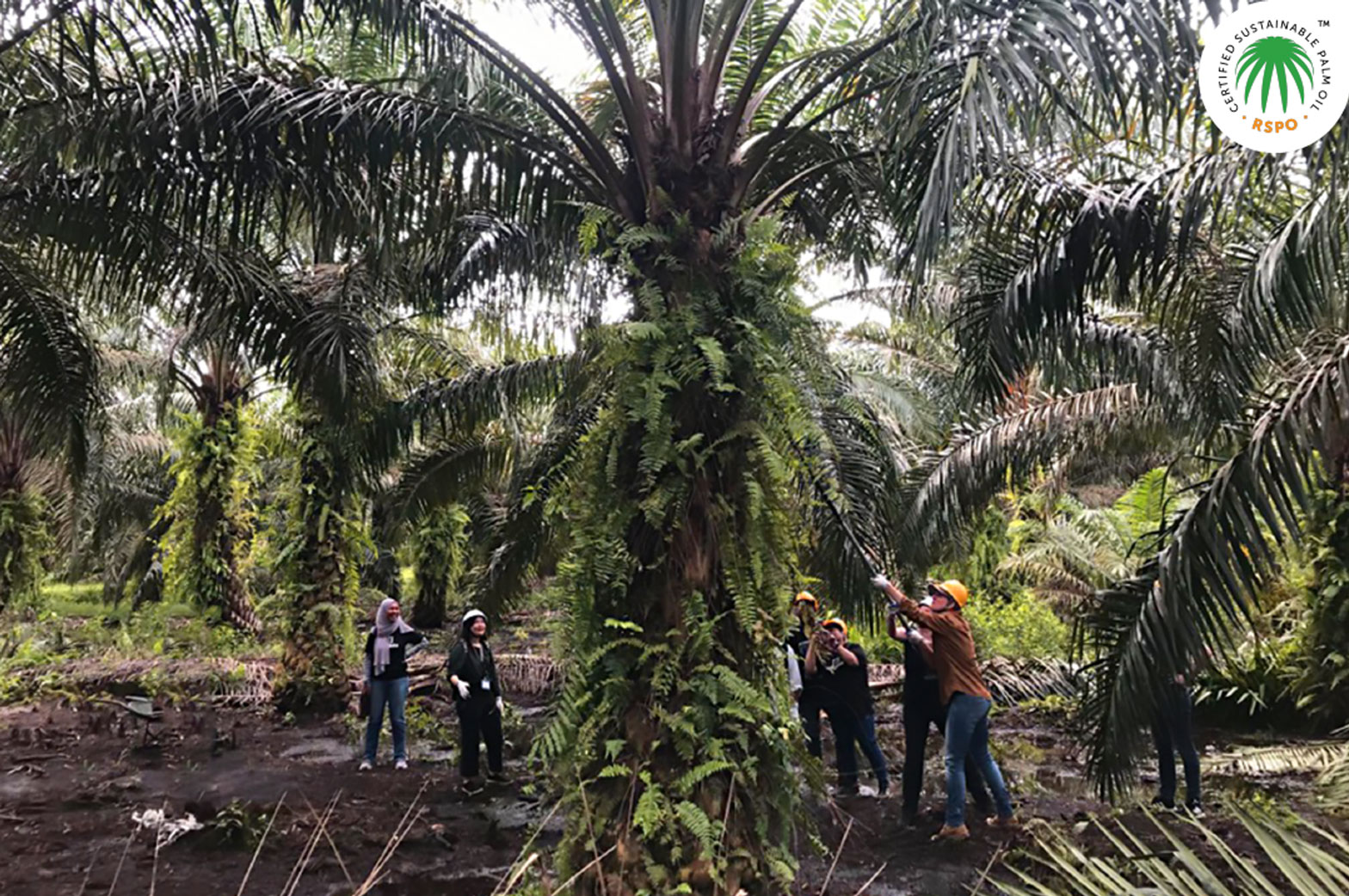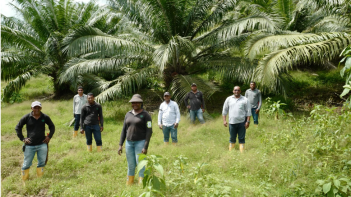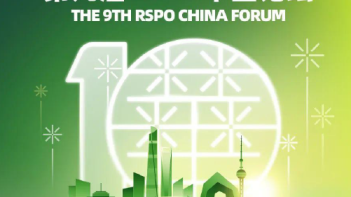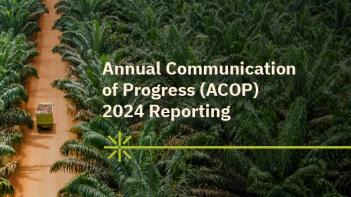
It may look like a harmless pileup of dried leaves on an oil palm frond, but it is actually a destructive force in disguise. The bagworm – a voracious, leaf-eating caterpillar ensconced within tiny leaves and twigs resembling a bag – is the most dominant pest affecting oil palms in Malaysia. A bagworm infestation can lead to widespread defoliation that significantly impacts yields.
When bagworms first appeared in the oil palm farm of Mrs. Long Tijah a/p Dongkin, a smallholder from the Orang Asli indigenous community in the Malaysian state of Perak, she was initially advised to inject their oil palm trees with the widely used pesticide monocrotophos at the cost of RM3 per tree.
“We considered the financial implications and the effect of the chemicals on the palm fruits and the environment,” Long Tijah said. Monocrotophos, while an effective pesticide, is a highly toxic substance for birds, fish and humans, and can cause death when ingested.
Instead, relying on their vast experience and deep relationship with the land, the smallholders decided to introduce a natural enemy of the bagworm – the weaver ant. They affixed weaver ant nests to the oil palms, and effectively countered the bagworm infestation. “Today, we no longer have a bagworm problem, our method proved to be good for both us and the environment,” she said.
Sustainable Palm Oil Journeys
Long Tijah is one of several smallholders that form part of the Wild Asia Group Scheme (WAGS), a social enterprise whose overarching mission is to address the challenges faced by independent small farmers by helping them improve their farming practices and supporting them towards compliance with international standards such as the RSPO Independent Smallholder Standard (ISH). WAGS provides the working model for small farmers to better their livelihoods by increasing yields, diminishing environmental and social risks, and unlocking access to the international market for sustainable palm oil.
Reza Azmi, WAGS Co-founder and Executive Director, shared that working closely with smallholders such as Long Tijah over the years has helped foster mutual trust amongst the communities.
“One of our objectives was to find ways to bring more value to the small farmers,” he said. “We took a different approach by asking ourselves how we could reduce production costs and be less dependent on expensive farm inputs such as herbicides and fertilisers. We are now conducting trials to find inter-crops such as ginger, medicinal herbs and trees and sharing our BIO skills to enable other forms of food cultivation, such as vegetable gardens and mushroom farms.”
In 2023, Wild Asia resumed their Sustainable Palm Oil Journeys, an annual study tour that gives participants an opportunity to interact with independent producers, understand the farm-to-mill process, visit farms embarking on the journey towards regenerative agriculture, and gain insight into efforts supporting farmers in meeting RSPO certification standards.
Taking part in the study tour, RSPO had the opportunity to visit one of Wild Asia’s BIO Farms, which spans almost 400 hectares and showcases chemical-free regenerative agriculture as part of the WAGS BIO Programme. WAGS BIO farmers commit to adopting farming practices without agro-chemicals and non-organic fertilisers, and learn how to apply a range of farming methods, including organic, bio-dynamic or regenerative practices, as a way to transition to higher levels of sustainable farming.
One practice was incorporating the use of bio juice, a natural fertiliser made of organic matter with bacteria and complex enzymes. An on-site demonstration showed how organic matter such as rotting fish, grass clippings, pond water or rotten fruit is added to water to induce anaerobic fermentation, creating the perfect environment for bacteria to grow, and making for richer soil.
“Through our WAGS BIO approach, we began to see how current agriculture methods negatively impact fragile ecosystems, and so we found ways to nourish the soil microbiology by adding more organic matter such as mulch, or using fermented products as natural soil fertilisers.”
Overall, the system has shown impressive results, including improved soil conditions that lead to healthier palms that are pest and disease resistant and that produce higher yields of fresh fruit bunches (FFB).
“Just ask the farmers,” said Reza. “The leaves are greener, their fruits are heavier and more plentiful. As biologists, we notice the little things such as greater numbers of butterflies, insects, birds, and mammals digging into the soil, looking for grubs to eat. These are all encouraging signs that farms can become alive again with natural biodiversity.”
The things unseen
Indeed it’s the littlest things that have an immense impact on our natural ecosystems. “We tend to focus on what we can see, and on what grows above land, but we forget about the unseen world. The things we don’t see are in fact vital enablers of the agricultural system. We would not have had life on land if it weren’t for the mutually reinforcing relationship between bacteria and fungi,” said Reza.
Much like the “unseen” world, it is the smallholders who are the vital force of the palm oil value chain. Before joining WAGS, these smallholders were largely excluded from any form of institutional knowledge and best practices as they were mostly learning by themselves. They had no bargaining power nor support in liaising with mills and dealers. WAGS has not only helped improve the relationships and communication between some of these smallholders, mills and dealers, but has also helped them reap additional premiums over conventional FFB prices.
“RSPO has enabled us to go above and beyond the standard relationships that define how smallholders, dealers, mills and refiners operate, and to find a common goal that can benefit everyone,” explained Reza. “For example, the mill gets a secured offtake from the refiner, the dealer gets a special treatment from the mill and the farmers get additional premiums. We work hard to secure higher premiums for smallholders, while negotiating better value for RSPO credits. Overall, we’ve been able to show a year-on-year increase in net value for our smallholders,” said Reza. Having this long-term commitment for purchasing volumes with premiums has helped foster a good relationship between all parties.
Keep reading

Call for Expression of Interest: Independent Investigation of a Complaint

Latin American Smallholders, Key Global Brands Gather in Peruvian Amazon to Advance Sustainable Palm Oil

RSPO Forum for Members and Certification Bodies 2025: Strengthening Capacities and Building Bridges with RSPO Members

From Violence to Prosperity: Cultivating Sustainable Palm Oil in San Pablo, Colombia

Palmas de Tumaco: Enduring, Trusting, and Transforming in Colombia’s Pacific Coast
Carry Over Credits for Certified Independent Smallholder Groups

From the Amazon to the Aisles: Discovering Sustainable Palm Oil in the Heart of Peru

Global Trends of Sustainable Palm Oil and China's Pathway




